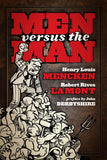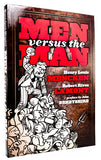Men versus the Man | H.L. Mencken & John Derbyshire
6×9 204 pages
$15.95
ISBN: 978-0-9830314-2-0
There is no irony in the fact that H.L. Mencken is a tall figure in the history of letters, and Robert Rives La Monte is wholly forgotten. La Monte, who worked at the Baltimore News as well as being an editor for the International Socialist Review, was a true believer in the promise of Socialism, and here he writes six letters trying to convince H.L. Mencken that he should reject his selfish ways and become a comrade in the revolution to usher in a perfect world. Mencken, long time writer for the Baltimore Sun, editor of The American Mercury, and prolific author and essayist, was the absolute worst choice of target for an evangelist of the common man. There have been few who were as openly resolved to a robust Nietzschean individualism. And so, in one of the turn of the last centuries greatest “flame wars,” we have the Bard of Baltimore’s six responses to those calls. The battle of the “collective good” versus “individual liberty” still rages in pitched battles. One difference is that this one, chronicling a hundred year old battle of egoism against collectivism, was fought well before National Socialisms tens of millions and Communism’s hundred million corpses would add more serious weight to subsequent debates. La Monte’s voice is rightfully now just one of many faceless advocates of class-warfare, and Mencken’s personality survives as the greatest advocate of social Darwinism and thus ultimately Mencken’s own views. With a preface from the anti-optimist John Derbyshire (We Are Doomed, Unknown Quantity, etc.) giving a historical context as well as his own perspective and its relavance to conservative thought today. “The argument of Men versus the Man is one we are still having today. The content of the argument is the relative desirability of two approaches to our social life. On the one hand is proposed a society of men: a society in which none is allowed to rise too high above another, a society that subtracts great resources from the more able in an effort to raise up the less able. On the other hand is a society of the man: a society in which individuals are left to do what they can with their inherited capabilities, in conditions of maximum personal freedom and minimal state control.” -John Derbyshire, from the preface Mencken biographer Terry Teachout stated: “(It) shows how (Mencken’s) political thinking had solidified–hardened, really. The law of the survival of the fittest, he declares, is ‘immutable,’ thus making socialism an absurdity; human progress is the product of the will to power, and all social arrangements failing to take this fact into account are doomed to failure; inequality is natural, even desirable, both in and of itself and as an alternative to mob rule; the world exists to be run by “the first-caste man.” -Terry Teachout, The Skeptic: A Life of H.L. Mencken Robert C. Bannister, in his Social Darwinism: Science and Myth in Anglo-American Thought stated that Mencken’s thoughts in this book are: “The antithesis of the progressive reformer, he responded to the tensions of the decade by voicing a darker side of middle class concern untempered by humanitarianism: worship of efficiency and strong leadership without democracy… unleavened by equalitarianism or internationalism. A Nietzschean social Darwinism, precisely because struggle for existence was the equivalent of a later generation’s rat race, provided the ideal rhetoric for expressing rebellion and disgust, however confused, with the growing constraints in American life… Mencken’s social Darwinism, like that of Ragnar Redbeard, was thus the exception that proved the rule precisely because both expressed a gospel not articulated in the West “since 300 A.D.!” Both depended on the ability to shock. Concerning Man vs. the Men… Mencken and his critics agreed he spelled out a logic that was implicit in all defenses of the existing order. Defenses of capitalism were really appeals to jungle force.” -Robert C. Bannister, Social Darwinism









